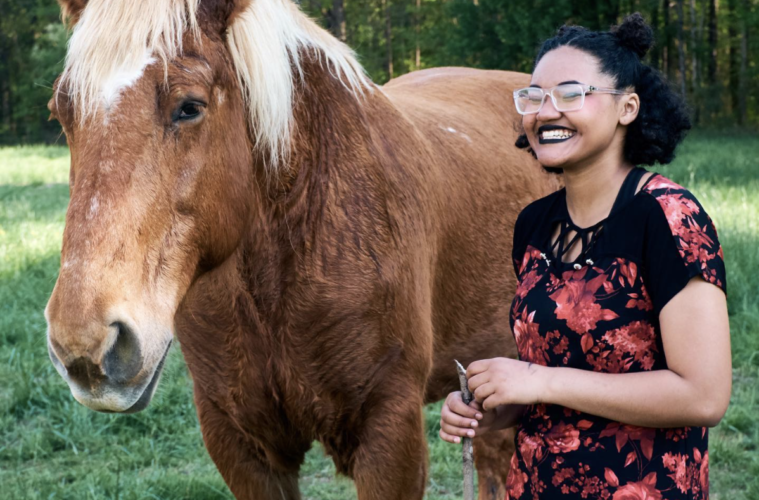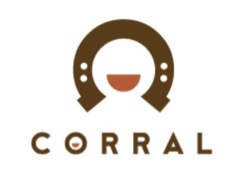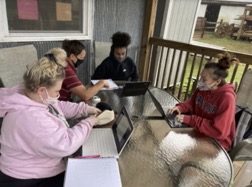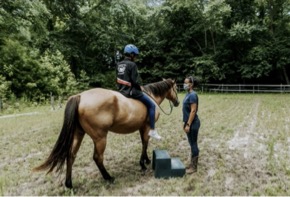Working out of two farms – one in Cary, North Carolina, and one in Raleigh, North Carolina, CORRAL Riding Academy is a non-profit organization utilizing the special benefits of human-horse interactions to give back to the community.
I recently visited CORRAL’s Raleigh location, and was impressed with the warm, welcoming atmosphere, open-minded team, and peaceful environment in which I was immediately encouraged to participate. Hearing about their mission in addition to meeting the team inspired me to stay connected, so I reached out to Managing Director Lauren Clements to learn more about their work.
CORRAL’s mission is to work with high risk youth in the community to provide academic support, individualized equine-assisted psychotherapy, family counseling, mentorship, vocational and life skills training, college and career preparation, and community support.
Most often, participants in this program are girls without access to resources to handle trauma they have been through. As Clements noted, many of these students are not on track for high school graduation, or collegiate opportunities, so providing a holistic approach to community support, complete with a licensed therapist and education managers, is critical to support the students in achieving new opportunities.
CORRAL’s holistic approach to academic and community support, counseling, and equine-assisted opportunities supports participants in achieving college and career preparation goals. Photo from CORRAL Riding Academy.
Part of what makes CORRAL so special is the commitment to the relationship between the girls and the horses – as stressed by Clements, “the horses are the “in” to teaching values and lessons.” By providing the girls with a space free of judgment or shame, the horses “unlock what the girls have been through,” allowing for CORRAL’s other services to build off of the foundation set by the horses.
Utilizing human-horse relationships assists in creating a safe, warm, and welcoming environment for participants to develop new skills and build upon an agreed set of values. Photo from CORRAL Riding Academy.
CORRAL’s equine team members help develop participants’ values that CORRAL has outlined as their core values. Many equestrians will be very familiar with many of these values, including accountability, grit, and safety.
While striving to achieve organizational goals towards their larger mission, CORRAL and CORRAL’s participants have outlined core value sets by which they work daily. The six value sets are as follows:
- Faith and choice: While CORRAL is a faith motivated non-profit, CORRAL recognizes that it is a choice to have faith, and welcomes all participants.
- High expectations and accountability: High expectations for participants are maintained, but participants are given ample support and structure to encourage follow through on the standards outlined by the participants within the program.
- Innovation and grit: Of course, working with horses certainly requires innovation and grit! As horses play such a large role in CORRAL’s programming, participants are often in situations with horses that require a commitment to innovation and grit in exploring solutions to new challenges in communication or work.
- Relationship and Community: Similarly, hard work is required in establishing good relationships with our equine partners while building community within our barns. CORRAL’s program is set in such a way that brings people together to achieve high quality work. However, holding onto the commitment to center these relationships and community is necessary for such a collaboration.
- Grace and learning: CORRAL acknowledges that everyone makes mistakes. However, through providing grace in learning from a mistake, participants can “fail forward” and grow through the learning experience of making a mistake.
- Safety and risk taking: Finally, CORRAL’s 6th value set is safety and risk taking. Time is spent building relationships between participants and their equine partners to develop a safe and trusting partnership. From the foundation of trust, participants can then take new, safe risks to challenge themselves to grow.
Looking towards the future, CORRAL’s team is excited to see an expansion of their locations to allow for an increased impact on the numbers of participants that can benefit from this program. In the meantime, Clements encouraged equine enthusiasts everywhere to support CORRAL’s mission by asking what each of us can do to give back:
“Who is in your community that you can invite to be in the equine world? What resources do you have, and how can they be used to provide access to those who don’t have access?”
If we each ask and answer these questions for ourselves, we can build upon CORRAL’s work to expand access to equine interactions and the values our equine partners teach. To learn how to get involved in CORRAL’s mission, you can visit their website.




